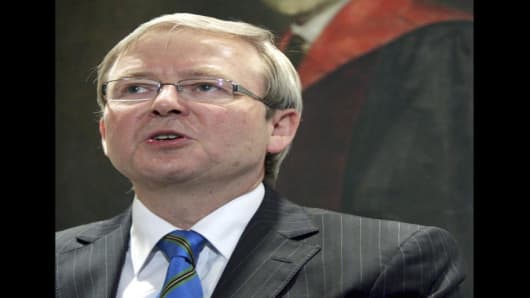Australian Prime Minister Kevin Rudd promised not to retreat into a new era of protectionism on Thursday in response to the global financial crisis, and urged other governments to hold their nerve.
Rudd said governments feeling the impact of the financial crisis would be tempted to blame globalization and respond by putting up new barriers and regulation to their domestic financial markets.
But he said governments should hold firm on policies that would promote ongoing economic stability. "Global economic problems require global solutions," Rudd said in a speech to an economics conference.
"As financial markets become more global, and assets are traded more quickly between nations, so too must regulation and supervision become more global."
He said better international rules on transparency of risk exposures, valuations and leverage were needed to rebuild confidence after the crisis, sparked by the collapse in the subprime mortgage market in the United States.
Rudd said Australia's central bank would continue to monitor international liquidity needs and take part in any coordinated central bank action, if needed.
He said the Reserve Bank of Australia would also monitor and maintain appropriate support for domestic liquidity needs.
Rudd cautioned against any push for more domestic protection for financial markets. "It may seem to some that we would achieve more domestic economic stability if we were less open to global market volatility. That is not the view of the government.
"Openness and full engagement with the global economy has given Australia much more economic growth than before. Protectionism, by contrast, would limit Australia's opportunities, delivering a sclerotic economy and declining living standards."
Rudd said the financial crisis highlighted the importance of a successful conclusion to the Doha round of world trade talks, which aim to free up world trade.
"The successful conclusion of the Doha trade round would give the global economy a much-needed psychological boost at a time when there is a heightened risk of protectionism. Particularly at a time when the psychology of protectionism may become acute," he said.


